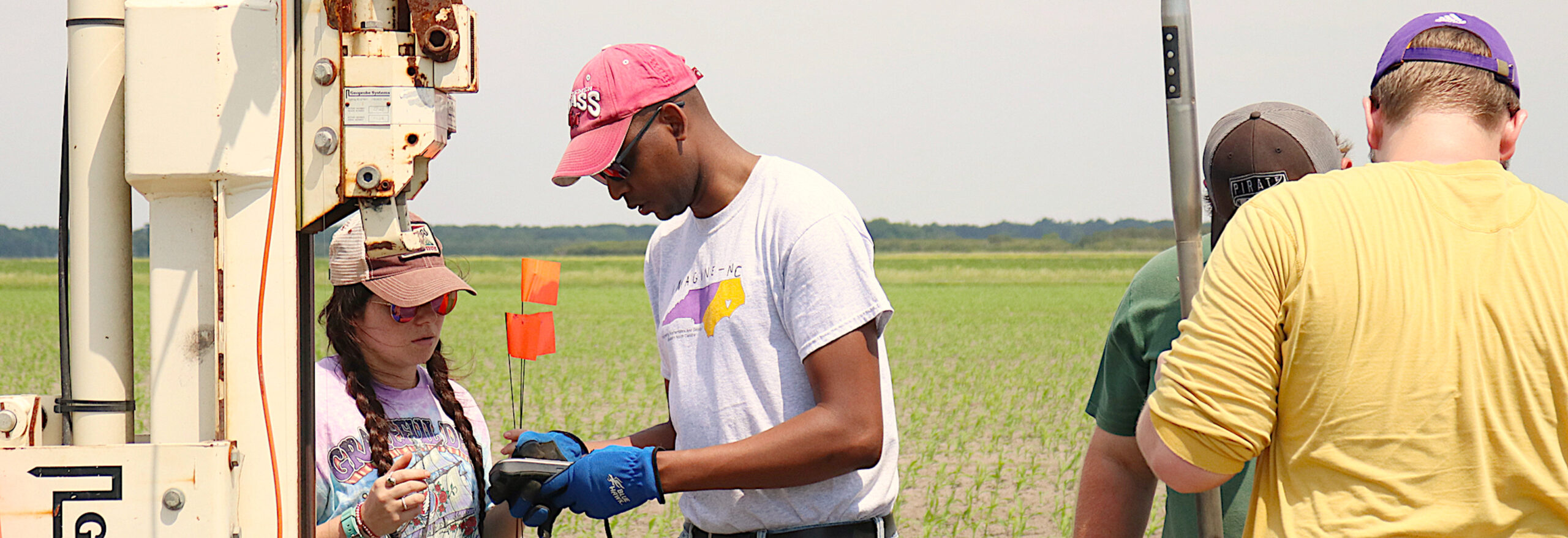
Groundbreaking Research
We have supported scientists and specialists at all stages of their careers.
In recent years, our Core Research Projects and other key initiatives have investigated:
- environmental change and flooding,
- threats to transportation systems and coastal infrastructure,
- shoreline management and other strategies for building coastal resilience,
- the impacts of development,
- emerging contaminants and other threats to water quality,
- threats to coastal and marsh habitats,
- invasive species,
- new aquaculture techniques and technology,
- threats to fisheries and aquaculture,
- finfish and shellfish populations,
- preserving coastal cultures and histories,
- disaster recovery,
- strengthening community networks,
- economic research and analyses,
- and other topics.
Our work:
- Alex K. Manda on weather events and water quality.
- Antonio B. Rodriguez on core sampling and marsh migration.
- Stan Riggs on “A Brief History of Sea Level Rise in North Carolina“
- David Shane Lowry on how researchers and Robeson County residents united on Project BRIDGE.
- Jane Harrison on coastal wastewater management in the face of rising seas.
- Hans Paerl on “Monitoring and Assessing Water Quality Across the Neuse River Estuary-Pamlico Sound Continuum.”
- Narcisa G. Pricope on balancing green and gray infrastructure to mitigate coastal flooding.
- Kathryn Stevenson on how kids are inspiring adults to address climate change.
- Barbara Doll’s work on resilient transportation routes.
- Grant D. Murray and Lisa Campbell’s study of coastal residents who fish for food and their community connections.
- Georgina Sanchez and Elyssa Collins’s project to map projected climate change and flooding in coastal North Carolina.
- Ben Reading and Linnea Andersen’s breakthroughs on state-of-the-art striped bass farming.
- Barbara Doll, Gloria Putnam, and Jack Kurki-Fox’s investigation of plastic pollution in our waterways.
- North Carolina Sea Grant and NOAA’s research and modeling of rip currents.
- Daniel Obenour and colleagues’ hypoxia forecasts for the Neuse River estuary.
- Devon Eulie and colleagues’ work on building resilience through shoreline management.
Much of this solution-oriented science relies on key contributions from coastal communities. North Carolina Sea Grant also facilitates special research partnerships specifically designed to fuse community and academic expertise through the Community Collaborative Research Grant Program. These projects generate creative problem-solving for coastal and water-related challenges that our state faces.
Recent Community Collaborative Research Grant (CCRG) projects:
- RISING: Perspectives of Change on the North Carolina Coast.
- The Greatest Show on the East Coast: New Journeys into the Heart of North Carolina’s Darkness.
- New Links in the Sea-to-Table Chain: The North Carolina Local Food Council Responds in the Pandemic’s Darkest Hour.
- In the Wake of Storms: The Network That Deploys Aid to Coastal Communities After Hurricanes.
- Podcasting a Wide Net: Student Journalists Offer Coastal Voices on Climate Change to a Worldwide Audience.
- A Fish for All Occasions: A Quest for the Heart of the Local Seafood Lover.
To mentor and train the next generation of scientists and policymakers, North Carolina Sea Grant also provides graduate student fellowships and other research opportunities. These projects often address novel areas and new issues of concern.
Research from recent fellows and students:
- Maya Hoon on climate change and the rise of antibacterial resistance.
- Lauren D. Pharr on the impacts of climate change on birds of North Carolina.
- Haley Plaas on algae, air quality, and the impacts of cyanotoxins.
- Olivia Vilá on flood risk and recognition of the Latino and Latina community.
- Karla Lopez on enhanced engagement and risk communication for underserved communities.
- Austin Gray on the environmental implications of antibiotics pollution.
- Alireza Gharagozlou on a new model to predict storm impacts.
- Jasmine Hayes on how vulnerable communities respond to flooding.
- Aaron Ramus on the impact of the invasive seaweed Gracilaria on hard clams.
- Erin Voigt on juvenile blue crab habitats in Pamlico Sound.
- Olivia Caretti on the surprising implications of eavesdropping on fish.
- Riley Mulhern’s study on how to predict contaminated drinking supplies.
- Melinda Martinez and Emily Ury’s investigation of coastal ghost forests.
- Yener Ulus’s research on rising seas and toxic mercury levels.
For a look at the full array of research opportunities for new and established scientists available through North Carolina Sea Grant, access our funding opportunities. Opportunities become available on a rolling basis, with new studies launching throughout the year.
